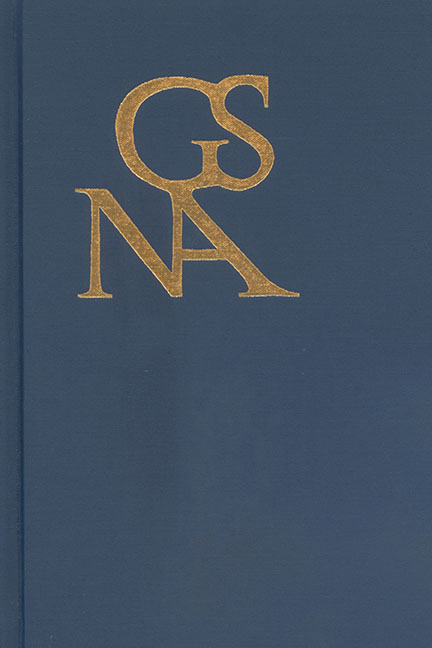Joel B. Lande. Persistence of Folly: on the Origins of German Dramatic Literature. Ithaca, Ny: Cornell Up, 2018. 354 Pp.
Published online by Cambridge University Press: 28 October 2020
Summary
In casting around for a title, Joel Lande could have justifiably paraphrased that of Nietzsche's own first book: “The Birth of German Drama out of the Spirit of the Fool.” This shorthand gives an idea of the forceful case that Lande persuasively makes in his book, Persistence of Folly: On the Origins of German Dramatic Literature. He shows that far from being a transitory phenomenon that waned after the 1730s, the fool can, in fact, provide a key to understanding the historical development of German literature in the entire eighteenth century. To do so, Lande draws upon insightful analyses of contemporary performance practice, genre theories, and discourses of nationhood. Anyone interested in the literature, history, and cultural currents of baroque and Enlightenment Germany will benefit from this engaging book.
Traditionally, the fool (known in German stage practice under a large variety of names: Hanswurst, Pickelhering, etc.) is supposed to have slowly disappeared from the German-speaking lands after his banishment in an elaborately staged ceremony in 1737. By the time authors such as Lessing and Goethe raised German dramatic literature from obscure backwaters into international recognition, they did so noticeably without the hitherto most beloved figure of the German stage: the raunchy Hanswurst. But Lande shows that, though displaced from his motley costume, the function of the fool is at work in surprising ways in both mid- and late eighteenth-century drama.
Lande's argument is clearly developed in both the overall trajectory and in strong readings of individual chapters. The book is divided into four parts of four chapters each. In the first part, Lande lays out the performative practices of seventeenth- century clowns so that the continuity of the fool's function will be recognizable among the widely different forms of later drama. Lande begins with a bowdlerized transformation of Hamlet (1710/1778) in order to sketch out the concerns and dichotomies that will typify the fool's actions as the “reproduction of a theatrical form.” Chapter 2 traces the fool's peregrinations as an itinerant immigrant from England in seventeenth-century Germany. Chapter 3 brings one important feature of the fool's presence into focus: his ability to act both within the fictional world of the play as well for the spectators without. Here Lande sensibly introduces “the term liminality” to describe the fool's transgressive status.
- Type
- Chapter
- Information
- Goethe Yearbook 27 , pp. 370 - 372Publisher: Boydell & BrewerPrint publication year: 2020



